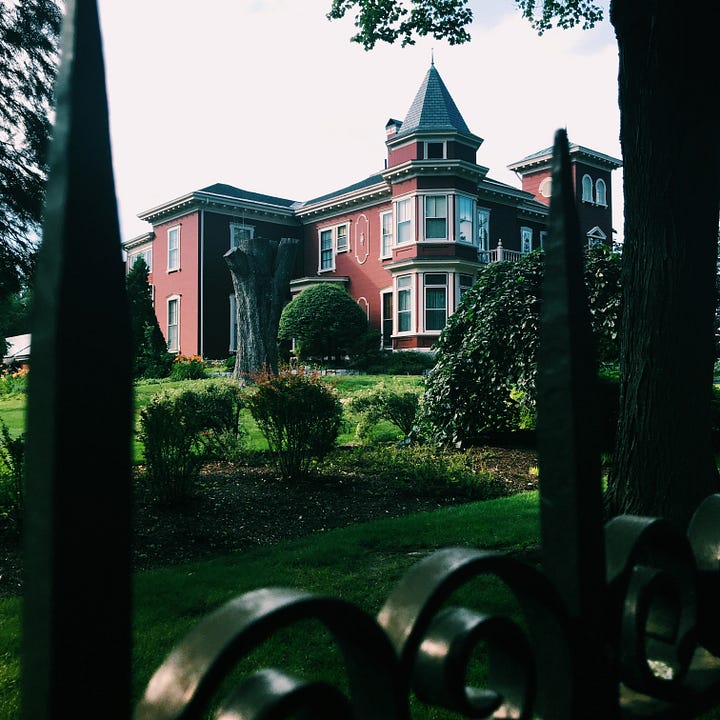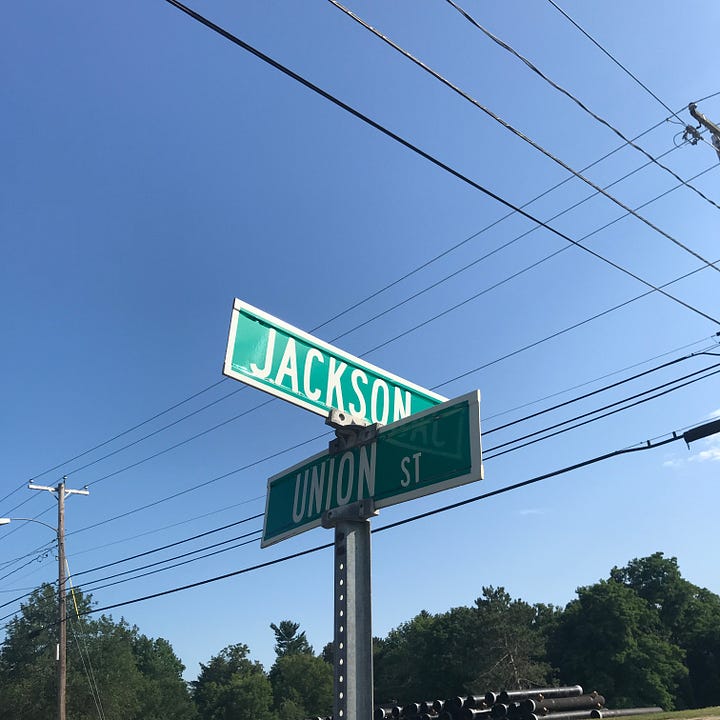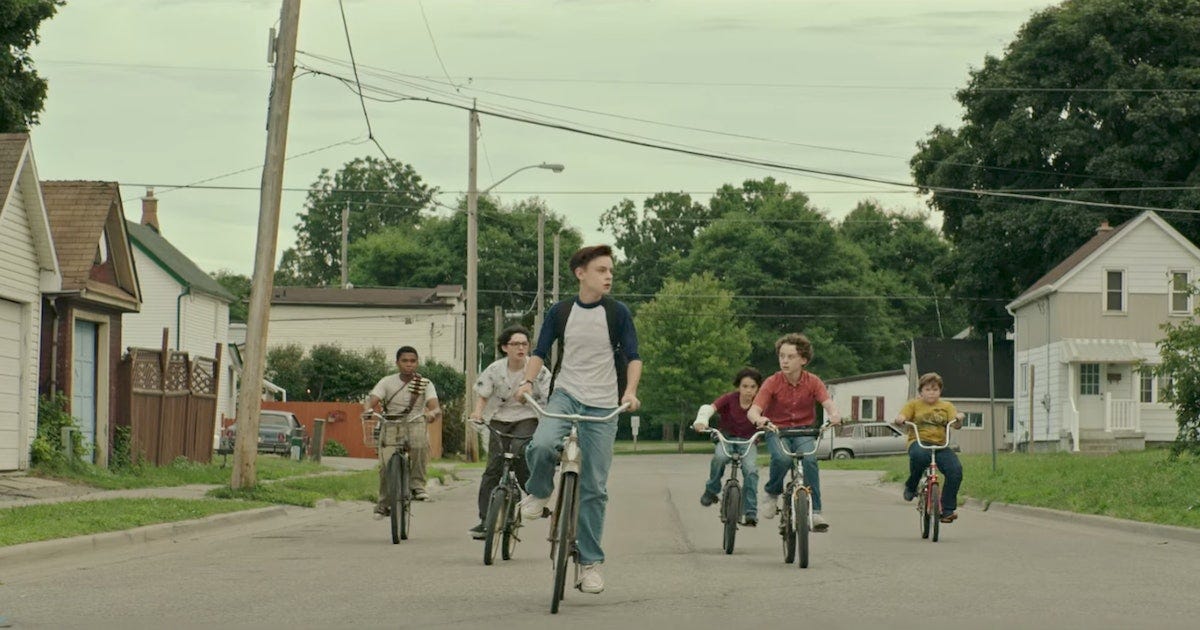Small towns are the scariest places
From Derry to Hawkins, small towns are one of horror's favorite settings. But why? Why are they so damn spooky?
The Calibray Job is a serialised sci-fi/horror novella. This is the behind-the-scenes commentary for the fifth episode. Read The Calibray Job, Episode Five.
Imagine this. You’re an insurance investigator. You’re very good at your job and you’re proud of that fact. Your biggest client, a New York publishing house, has called on your services. Their prize author has gone missing with the manuscript for his latest book and the publisher wants you to track him down.
Sure, being attacked with an axe by the crazed agent of said bestselling novelist is a red flag, but you’re not a superstitious person. You don’t believe the rumours that are circulating about the author’s latest book. All you know is that all signs suggest his current whereabouts to be the small New Hampshire town of Hobb’s End. That’s where you’ll start your search.
A taste of the forbidden: movies that feel like you probably shouldn't watch them
The Calibray Job is a serialised sci-fi/horror novella. This essay is the behind-the-scenes commentary for the seventh episode. Read The Calibray Job, Episode Seven. I remember the first time I watched The Exorcist. Sure, the demon bile and backwards stair walking scared me but what I found more terrifying was how the act of watching t…
In case you’re unfamiliar, I’ve just described the premise of John Carpenter’s 1994 movie In the Mouth of Madness starring Sam Neill as said insurance investigator John Trent. Of course, what Trent finds in Hobb’s End defies logical explanation. The town is in the grip of an unexplainable madness brought upon by the latest manuscript by horror novelist Sutter Cane. What follows is an apocalyptic vision of horror that blooms out from Hobb’s End, threatening to consume the world.
Sutter Cane is an obvious analogue of Stephen King. A famous horror author, known around the world, whose books have an intoxicating way of worming themselves into your brain and consuming your every thought. But Cane is far from the only thread that Carpenter’s film shares with King.
Hobb’s End is very much in the Kingesque tradition of the ‘small town’. Derry, Jeruselem’s Lot, Castle Rock. These are just a few small towns in the King Universe. Rarely does King deal with city-based horror, instead preferring to narrow the scope of his stories to focus on the boundaries of small, American towns.
Derry, perhaps his most famous small town, is the physical manifestation of Pennywise. The shapeshifting horror has infected every aspect of Derry from its waterways to its people. The scale of the town affords a certain claustrophobia you’d miss if It were set in a city. Don’t get me wrong, this isn’t to say cities can’t be scary but small towns like Derry can quickly be made to feel like prisons for your characters.
The fact that, in a small town, everyone knows everyone and, in many cases, you can walk or cycle from one end of town to the other, makes the horror feel as though it is surrounding you from all angles. The infection metaphor is apt because the spread of existential horrors through these small towns often consumes in much the same way a virus might.
In episodes four and five of The Calibray Job, we finally arrive in Harben. So far as anyone can tell, Harben is the only town on the whole planet. It was originally built to support the mysterious research facility that is the ultimate destination for our crew but has since gone on to develop a life of its own. In describing the town, I wanted to evoke the sense that the town was rotting. Not dead, so much as dying. Constantly dying.




“Wind carried drifts of red sand up from the banks of the lake into the town, coating what was left of its buildings. The decaying homesteads groaned loudly, wood snapping and metal sheering under the cycle of constant storms that moved overhead in great amorphous clouds.”
The town is slowly being buried by the world, decaying and falling apart as a result of whatever happened beneath the waves of its nearby lake. Like Hobb’s End and Derry, Harben is a physical manifestation of the evil that has begun to consume Calibray.
“A building she supposed was once a store was a blackened husk of petrified wooden beams and old boards. The ever-growing wind moved a loose layer of soil on the ground revealing shrapnel from an explosion that protruded like knives in the red earth.”
When we finally make it inside one of the collapsing houses, the situation is much the same. Everything about this place is dying. The only two people that Beck and Nera encounter (up to this point), the old man and the child, echo this.
Take this description of the girl, “beneath the layers of dust, Nera could see a delicate face. Sharp blue eyes that punched through even in the din of the storm. Blonde hair hung in clumps around her face and on her shoulders over the top of a dress whose once yellow and black floral pattern had turned a sickly brown.” She is hidden beneath a layer of decay, much the same as Harben itself.
This draws on the ideas I mentioned way back in my first commentary on episode one. There’s a reason most folk horror takes place in small towns, right? The true nature of Harben, and indeed the planet upon which it resides, has yet to be revealed. Or, maybe, much like Hobb’s End and Derry before it, the true darkness within this place might never fully be uncovered.








Totally agree, Matt.
Although I've never played it, Alan Wake also leans into small-town vibes as well as having a horror writer as the protagonist. I can only assume it was somewhat inspired by King and Carpenter and probably more.
Also, apologies for being behind on Calibray. I have a stack of Stacks to catch up on at the moment!
Hit the nail on the head here. I think that sense of claustrophobia that a small town affords is super important to horror. Lovecraft did this really well too with the likes of Innsmouth.